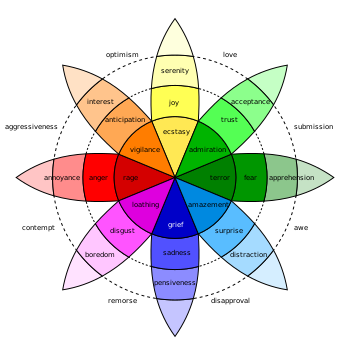So, for the last week or so, every couple minutes, I’ve been recording how I feel. Now, this sounds like something a half baked therapist would tell me to do when I’ve been complaining about something. But here I am, no therapist, doing it. Why? It sounded “deep” and I needed space on my podcast. But, I don’t know. I felt like doing it. And so, I decided I’d run with it. I wanted to do this in a half way scientific way, so I decided from the moment I woke up to the moment I go to sleep, I’d try to record how I felt at 10 min intervals for a week. This, I figured would give me enough data to look at after the experiment was done. And immediately I hit a roadblock. I have no idea how to describe how I feel. I don’t feel in English. I don’t know how to put in words how I feel most of the time. I looked up a couple systems that people have created to categorize emotions, so I could have a “toolkit”, so as to speak, to allow myself to describe my emotions.

This is one of such emotion palletes that I looked into to help me describe how I felt. But the single words that they all offered me didn’t seem to encompass all the things that I could feel. I mean how could I try to condense the emotion that I had at Noodle Gourmet, deciding whether to get watermelon or taro bubble tea, deciding taro, realizing I wanted watermelon all along, but taro was good as well? I don’t feel with an eye to be described in words. But then, what do I do? I decided that trying to fit emotions in the model that they set out might be useful for a scientific setting, but, that’s not exactly how they work. I figured I’d just write the first word that came to mind describing my emotional state, since that might allow more nuance and specificity. So, I started doing that.
I started to consider what this might do for me. I mean I know it’s good be “aware of oneself”, but other than that what might this do? I started to wonder if doing this was really what I felt. What if doing this actively made me adjust how I felt in response to the things I was recording? Like if I saw that I said I was sad a couple times in a row, I might think about that and change it for the next time. Making it not what I normally would feel in this scenario. And then I asked myself, “Isn’t that the point?” It wasn’t the point to find out the emotions I was feeling. The point was to find out what knowing what I was feeling at any one time would do for me. And apparently it gave me a greater impetus to change what I was feeling to something more agreeable. Which, I mean, sounds pretty good. If I see that I’m bored for a whole day, the next day I might just do something unusual. Something that I wouldn’t have done otherwise, if I wasn’t so aware of the past day’s boredom. I think this is the core of why being in tune with yourself is beneficial. It allows you to adjust yourself more rapidly to fix your problems. Ignoring your emotions might make you not change your situation to a better one simply because you’re not aware of it. In addition, I’m becoming more aware of the effect the environment has on me. Looking at it another way, this list of emotions is sort of a snapshot of the environment’s I’ve been in through my eyes. The world, with a little bit of Arul slapped onto it. I mean, this is me. Technically, to get unnecessarily abstract, this is how I’ve existed for the past week. This was me for the past week as I interacted with the world. Which is sort of pretty to think about, but the thing is, everyone watching, everyone living has this going on inside of them, and this is the bare minimum of what’s going on. This is updated every 10 mins, but , every second, every millisecond, my brain puts out new reactions, new feelings, in response to the world I’m experiencing at that moment. There’s a hidden richness of life within myself and everyone else that becomes available when one acts with cognizance towards their emotional states.